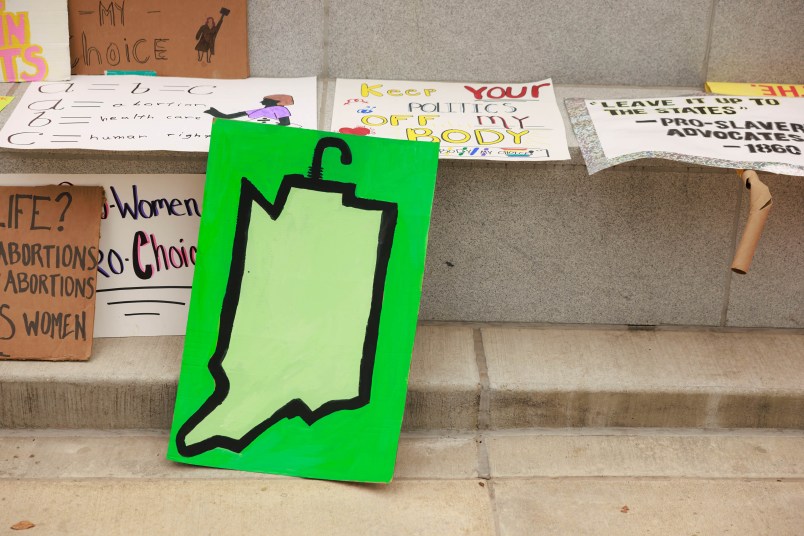An Indiana appeals court Thursday upheld an injunction for plaintiffs arguing that their religious beliefs entitle them to an exemption from the state’s near-total abortion ban.
A few individuals and Hoosier Jews for Choice said that they believe that life does not begin at conception and that the life of the pregnant woman outweighs the “potential for life embodied in a fetus.”
The argument turns one of the anti-abortion movement’s most reliable talking points on its head and takes the mantle of “religious conviction” from conservative Christians, who have wielded it so successfully, both in courts of law and public opinion.
“If a corporation can engage in a religious exercise by refusing to provide abortifacients — contraceptives that essentially abort a pregnancy after fertilization — it stands to reason that a pregnant person can engage in a religious exercise by pursuing an abortion,” wrote Judge Leanna Weissmann for the Court of Appeals of Indiana. “In both situations, the claimant is required to take or abstain from action that the claimant’s sincere religious beliefs direct. And in both situations, the claimant’s objection to the challenged law or regulation is rooted in the claimant’s sincere religious beliefs.”
Weissmann also pointed out that the exemption plaintiffs seek aligns with the (scant) exemptions included in the abortion ban.
“The broader religious exemption that Plaintiffs effectively seek has the same foundation as the narrower exceptions already existing in the Abortion Law: all are based on the interests of the mother outweighing the interests of the zygote, embryo, or fetus,” she wrote. “The religious exemption that Plaintiffs seek, based on their sincere religious beliefs, merely expands the circumstances in which the pregnant woman’s health dictates an abortion.”
The group also sought class action status for “all persons in Indiana whose religious beliefs direct them to obtain abortions.”
The majority ultimately upheld an injunction blocking the abortion ban for the plaintiffs, but sent the case back down to the trial court to narrow it; the state complained that the injunction would allow plaintiffs to get abortions that aren’t dictated by their religious beliefs.
In his concurrence, Judge Mark Bailey was even more explicit about how Indiana lawmakers have favored the conservative Christian viewpoint on abortion in their post-Dobbs legislation.
“Yet in this post-Dobbs world, our Legislature has done just that – preferred one creed over another,” he wrote. “Based upon the premise that the State has a compelling interest in the outcome of a woman’s pregnancy arising at the very moment of conception, there is a codification of when life begins, something intensely debated among adherents to various religions.”
He cracked that lawmakers are ill-equipped to decide a question still confounding theologians.
“Legislators, an overwhelming majority of whom have not experienced childbirth, nevertheless dictate that virtually all pregnancies in this State must proceed to birth notwithstanding the onerous burden upon women and girls,” he wrote. “They have done so not based upon science or viability but upon a blanket assertion that they are the protectors of ‘life’ from the moment of conception.”
“The least that can be expected is that the remaining Hoosiers of child bearing ability will be given the opportunity to act in accordance with their own consciences and religious creeds,” he concluded.
Read the ruling here.
The Best Of TPM Today
Cannon Denies Trump Presidential Records Act Dismissal Bid For Now — Josh Kovensky
Yesterday’s Most Read Story
Special Counsel Jack Smith Is Done With Judge Aileen Cannon And Lets It Show — David Kurtz
What We Are Reading
Biden warns Netanyahu the situation in Gaza is ‘unacceptable’ — WaPo
No Labels Will Abandon 2024 Presidential Campaign Effort — WSJ
How Steve Bannon guided the MAGA movement’s rebound from Jan. 6 — WaPo







Ruh-roh, Raggy… you mean Religion isn’t just the province of the Evangelicals?
And that, my friends, is the nub of the pro-abortion factions. The whole discussion of when life begins is very clear in the Bible - when the first breath is taken. Not before.
This is great news! Be careful what you wish for…
Ayup. No exemptions to the ‘stone the adultress’ are given for if she’s pregnant. But then, the whole adultery thing is about making sure the man knows that whatever kids come out of his wife are entitled to inherit his property. Probably also why there’s a ritual in the bible for determining if the wife’s been faithful that (supposedly) has God auto-abort any kid she’s carrying if she’s cheated.
My story on something like this:
Back in the 80s, my first ex and I were already separated, but not yet divorced. I determined to be a surrogate mom for my sister and her second husband (she’d had her tubes tied after her first divorce and the cost to reverse was prohibitive with only a 50% chance of success).
The lawyer that handled the surrogacy was also my divorce lawyer. Turns out, because I was still married, even though the paperwork was in progress for the divorce, had I become pregnant before the divorce was final, my ex would’ve had claim on the child, even though his DNA was nowhere near the child.
So once the lawyer got the final decree on the divorce, he put the surrogacy documents through.
The child of that relationship is now 35 years old. I married my second husband halfway through the pregnancy.